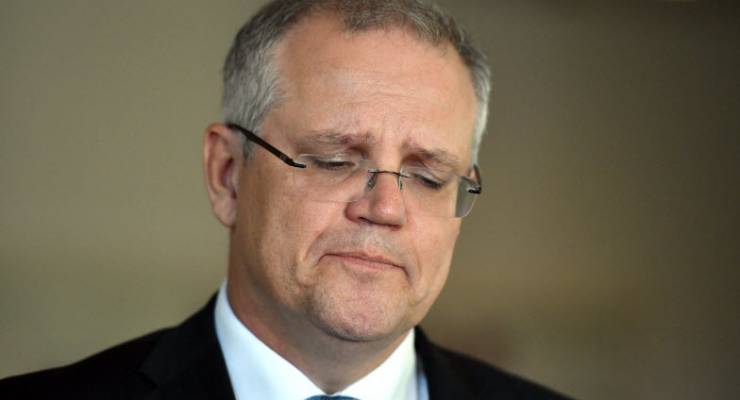
No matter what the result from the national accounts this week, Australia will rack up a new record for the longest period of recession-free growth of any country. Aussie Aussie Aussie, oi oi oi, etc.
Despite that, there’s plenty of talk of recession, given poor expectations about growth in the March quarter, which will be the GDP data we get on Wednesday, with the possibility it might show negative growth — the second quarter this financial year to show the economy going backwards.
While most commentators are careful to refer to “technical recession” (two quarters of negative growth), the r-word appears to hold a certain allure for the media and some economists, for a variety of reasons. Bob Gregory was quoted in a weekend article suggesting Australia had been in recession ever since the financial crisis. And there’s always Steve Keen, who appears to take a Hanrahan-like glee in predicting property price collapses, unemployment and the four horsemen of the apocalypse, or fund managers who think “sell everything, disaster’s coming” is a good way to get some publicity, given few people ever bother to check their predictions.
But while much of the discussion about our record recession-free run has focused, rightly, on the liberalisation of the economy in the 1980s and 1990s, the last decade has been significant as well. That’s the period in which we handled a global financial disaster and ensuing global slowdown, and then a resources boom (which, throughout Australian history, has always ended in an inflation explosion). Both times, we managed to keep the economy, and employment, ticking over — an unprecedented feat from our political and economic leadership, and particularly former treasurer Wayne Swan and former RBA governor Glenn Stevens.
(Moreover, we handled a significant slowdown in the economy in 2013-14 as well, thanks to the Reserve Bank keeping interest rates low and Joe Hockey and Tony Abbott dumping their obsession with debt and deficits and deploying deficit spending to support growth.)
The economy has also responded far more flexibly to this series of challenges than in the 1980s or 1990s. Buffers like a floating currency and an independent monetary policy have been in place for decades, but as the RBA and Productivity Commission have pointed out, the current industrial relations framework — Labor’s Fair Work Act — has allowed the economy to respond to slower growth without a big spike in unemployment.
But despite those low interest rates and despite the government pumping another $38 billion in deficit spending into the economy this year, the budget forecast growth of just 1.75% this financial year. No one, not even Scott Morrison, is expecting that this week’s GDP figure, and the following one in September, will show strong growth. But as Peter Switzer noted last week, there is actually quite a bit of positive economic news around at the moment, making for a mixed rather than gloomy picture. And there was better news in today’s Business Indicators data, with rotten wages growth numbers — 0.9% across the year to March — but a 6% rise in company profits in the quarter and a strong 1.2% rise in inventories (all seasonally adjusted). There were also rises in petroleum and mineral exploration spending in the quarter.
The problem with using the r-word — whether appended with “technical” or not — is that it can spook consumers, who are already closing their wallets because of stagnant wages. We saw how important consumer confidence was in 2008 when consumers positively reacted to the Rudd government’s aggressive response to the financial crisis. Too much talk of recession now, on the other hand, could tip us into negative territory and keep us there longer than otherwise would be the case.
For those who remember the dislocation and social and economic damage of the early 1990s recession, this is about more than newspaper headlines and publicity-craving economists and screen jockeys. And words have consequences — especially the r-word. It should be used sparingly, and only when justified.








While the real economy floats on a froth of speculation and sentiment for frivolous consumptio, we remain vulnerable to recession whenever somebody shouts “fire”.
What spooks consumers is falling real incomes, declining job opportunities, greater higher education costs and the reduction in available paid work hours. Add the real decline in wages and jobs in the mining industry and their services and anyone can see there will be a dramatic reduction in PAYE revenue to the ATO. Every day we are assailed with examples of the biggest companies in this country paying minimal or no taxes, miners paying tiny or no royalties, gas producers setting export records yet dodging RRT for the foreseeable future.
No input from the pundits is necessary to see the bleak future.
Well yes. Abbott did nothing else for half his term as opposition leader and all his term as PM. Guess what it worked.
When, not if, international trade & confidence in financial rectitude collapses – whether due to the idiocy of the OrangeOgre or simply its Ponzi structure – and the allegedly “essential external fund for investment” dry up, has the Reserve Bank given any thought to issuing infrastructure bonds for domestic purchase only?
Even if only for some supposedly make work like the Train to Nowhere (tm BK), as it is fiat money spent internally then there is no problem
Bring. It. ON!